Natural Disaster (Book 3): Storm Read online
Page 13
“We got at least three sucked out of the hall and outside into it.” That’s all he remembered, but there may have been more.
“God,” she breathed.
“It was awful to see. Including my daughter, Holly Duncan.”
“Of course, I know Holly. I’m so sorry. Is she—?”
Dead, he knew was the word she didn’t want to say. “No. She’s alive. But I found a boy who wasn’t. And there was another one….” His mind flashed back to the impaled boy. “I wouldn’t be surprised if there were a few more who didn’t make it. The adults seemed to be too heavy for the wind to pull out. We tried our best.”
She pulled an arm out from the blanket and gripped his forearm. “You did a good job.”
He shook his head. Not good enough. Not even with his own child.
“You got back here in time. If we wouldn’t have known in advance?” She let go of his arm and pointed to where the school had stood. “You and your partner saved dozens of lives by warning us. Including mine. Thank you.”
Greg didn’t want the thanks or the praise. He had failed to save everyone, and failed his own child. That was his job—his real job, not the job with the police. He was supposed to protect his child from harm, and he hadn’t.
“I should have held on to her tighter,” he said.
She grabbed his arm again and gave it a squeeze. “It’s an act of God,” she said. “I’m sure you did everything you could.”
Massey said his name and Greg stood up, the principal’s hand falling away as he did.
“What?” said Greg.
Massey wordlessly offered him his radio. Greg’s was still attached to his slacks, but he had flipped it off while he was hunting for Holly and listening for her voice.
The realization that he might never hear that voice again stopped the words in his throat.
Massey pulled back the radio and spoke into it. “Hang on a second.”
Greg drew a shaky breath and held his hand out, nodding an okay. He took Massey’s radio. “Yeah? Over,” he said.
“Duncan, Massey says you found your daughter. I’m glad to hear it. How are you?”
“Unhurt,” he said.
“I mean, can you work? I know you must be upset, but we have less than 25 first responders on the ground, between police and fire and even two retirees we’ve called in. Another day, I’d tell you to stay with your kid. They’re mobilizing a National Guard Unit. But until they’re here, I need you. Can you function?”
“I—wait, Chief. Let me think.” He glanced at Massey as if the other man might have an answer. “Chief, I have to be with my child.”
“I understand how you feel. But the town needs you, too.”
I’m going to quit this job anyway. He seriously thought about quitting it right now. But, no—Holly was going to need insurance. Maybe rehab. Maybe—he shuddered at the thought—surgery. And he had gotten into police work to do some good, after all. Here’s a last chance to do that. “Okay,” he said, feeling a wrench of guilt. “I can’t promise I’ll be at my best, but I’ll do what I can.”
“Great—” the Chief said.
Whatever she was going to say next was lost in the thunderous sound of an explosion.
Everyone’s head turned toward the sound. It came from about two blocks away.
A raging yellow fire was already alight, a swelling round bulb of it thrusting into the sky, pouring out black and gray smoke at its edges. As Greg watched, flaming debris rained out around the smoke cloud.
They all jumped as a chunk of metal hit not a hundred yards from the fire truck.
“Holy shit,” said Massey.
In another second, all the firefighters around the school were running for the truck and yanking on fire gear.
Greg looked at the row of injured people from the school lying there. He grabbed the EMT. “You can’t just leave these kids here.”
“I’m staying right here,” the EMT said. “I’ll keep triaging until I’m told to go somewhere else.”
“But—” Greg watched as the firefighters started gearing up to chase the fire. But what? Trade these lives for those at the fire?
He thumbed the radio on again. “Chief, we just had a major explosion here, two blocks or so west of here—maybe gas? Hang on.” He called to a firefighter. “Was that a natural gas main?”
“That or a propane tank.”
The smoke was drifting their way, and the uninjured evacuated from the school who were still standing around began to cough.
“Chief, yeah, it’s a fuel fire. I think they’re radioing to their chief now, and I think they’ll be sent to put that out. Over.”
“You and Massey need to stay with the school. There are still injured there, right?”
Greg handed the radio over to Massey, who had heard the question.
“This is Massey. We still have about ten casualties in the cafeteria, a couple pretty bad, and a lady who’s too heavy to lift out. We’ll need equipment of some sort to get her up.”
“Get the rest of them but her out. I’ll coordinate with Fire and tell you what to do after I check with the fire chief.”
To Greg, watching the firefighters gear up to go, the city seemed too disorganized. Wasn’t there a list of priorities somewhere? But then he realized there were no perfect answers to any of this. Twenty-five first responders. Probably dozens dead, and probably a hundred needing fast medical care. Hundreds of people who needed lesser assistance, who were having to wait for it. Another group of first responders was stuck in the collapsed police station, wanting to get out. It was like some horrible puzzle. He was glad it wasn’t his to work out.
He mentally shook himself, trying to separate the professional side of him from the father side. If he could grow wings and fly, he’d pick Holly up and fly her to a hospital. If his car was a block away and working, he’d drive her there. But for now, he’d let the EMT care for her and he’d do his own part for other people’s children.
The firemen helped move the injured away from the truck, and then they leapt onboard and, with a beep of their siren, pulled out, heading for the fire. They had to honk to get people out of their way. Greg looked down the street and saw dozens of people looking through debris of homes, and some wandering, looking dazed and lost. A few seemed to be parents, hurrying toward the school.
He glanced down at himself and saw the uniform. They wouldn’t give a crap about him having an injured child. He was an official, and they’d expect something from him.
Quickly, he bent and planted a kiss on Holly’s cheek. He tapped the EMT on the shoulder where he was working on the boy. “Tell me the truth. How serious is she?”
“There’s no obvious skull fracture. But there’s no way to know what’s going on in her brain that’s keeping her unconscious. For now, she’s stable. I’ll keep a close eye on her.”
“With your guys at the fire, I need to help rescue the rest of the kids.” He pointed at the ruins of the north side of the school.
“I’ll give you a high sign if anything changes with your kid.”
“Thank you.”
He flipped on his radio again and strode over to Massey, who had put his radio away.
“I hate leaving Holly,” Greg said to him as they started back to the school, “But I’m coming to help you.”
He only looked back at Holly once on the walk over. He felt physically pulled in both directions.
“Pay attention to what you’re doing down here,” Massey said, as they approached the pit where the cafeteria had been. “You won’t do her any good if you get yourself hurt, too.”
The one thing you could say for the tornado. The winds had been so powerful, when the school had blasted apart, much of the brick and steel had been blown east of the basement. If it had all fallen straight down onto them, there would have been many more injuries.
Not that there wasn’t plenty of junk strewn around in the pit. He couldn’t begin to inventory it all: A turquoise electric guitar, PVC pipes,
crumbled plaster, a School Zone traffic sign on a concrete base, branches, a window frame, a whole bathroom vanity from someone else’s home with its doors ripped off, and a big pile of Cheerios that had escaped their bag but were still in a neat pile.
How could Holly, a fifty-pound child, be ripped out of his grip while Cheerios just sat there? It wasn’t fair.
Mostly, the debris was wood—all over the ground, in the pit that had been the cafeteria, the lumber from hundreds of destroyed homes was strewn everywhere.
“You steady the ladder, and I’ll go down,” said Massey.
It was only then Greg saw that the top of the staircase was gone. A metal ladder from the fire truck was extended down to the first solid step.
“You’ve been hauling people up that?”
“The kids are pretty easy, if they don’t fight you,” Massey said.
Greg looked at him with new respect. Not a job for anyone with a fear of heights.
The male teacher he’d spoken to after the first tornado was down there, apparently unhurt, but missing his shirt. He seemed to be keeping everything under control.
“Rick!” Massey called, and the teacher looked up. He hurried over to the stairway and braced the ladder.
Massey swung his leg around the ladder. “He’ll steady it for the first few steps” he said to Greg. “Wait until I’m down, and he’ll do the same for you.”
Massey went down the ladder and slipped past the teacher, who called up, “Ready if you are.”
Greg tested the ladder, pushing it to either side to see how easily it slipped. It was not an ideal situation, but there was nothing else to do. He swung his leg over and went down as quickly as he could.
At the end, Rick said, “Wait a second,” and then moved and said “Okay. You’re clear.”
“Thanks.”
“We have only two more seriously injured. I got the bleeding stopped on Lupe’s leg, so she can wait until the second load.”
“Show me the way to the worst one.”
He was led to a little girl who held her hands up in the air. Dried tears had left tracks on her cheeks.
Rick said, “Her hands are pretty smashed up.”
Greg tenderly took her arm at the elbow to steady it and looked closely at the damage on one hand. Something heavy—a table or piece of furniture—had smashed her hand but good. There was blood oozing out around her fingernails, and her whole hand was purple. Her skin felt tacky.
How was he going to carry her if she couldn’t hold on? And how was he going to get her up there without bouncing her hands against something?
But looking more closely at her face, he thought he had to get her up fast. She was terribly pale, and looked like she might be in shock, which could be fatal to anyone, but kids could crash fast.
But how do I get her up the ladder?
He got her to lie on her back, settled her hands across her belly—she made a sound when he did—and cradled the child in his arms. She weighed little and he rose easily to his feet. She was lighter than Holly. “Follow me to the ladder, please,” he said to Rick. He needed all the help he could get with the ladder’s stability.
Could he back up it? No, no way. Shifting his grip on the child, he got her balanced so that one of his own hands could grip the ladder’s side rail. He kept feeling as if he were going to fall to the other side, and hurt them both, but he managed to stay balanced. Had the child been fidgeting or fighting him, though, it would have been impossible.
At the top, he had to set her onto the ground to finish getting himself safely up. Then he bent and took her up again and hurried her over to the EMT’s triage station.
They needed more equipment. He hoped people from nearby fire and police departments were rushing toward town even now.
He watched the EMT for a half a minute as he checked the girl. “Find me something like a big brick, or a plastic box, would you?” he asked Greg. “To elevate her feet.”
Greg scanned the ground and saw something that might work. He went to the square of dirty gray plastic and saw it was someone’s fishing tackle box. He brought it back.
“Good, thanks.”
Greg wanted to ask about Holly, but the man was busy, so he checked on her by himself. She was lying still on her board, with a Mylar blanket over her now. He couldn’t stop himself from checking the pulse at her neck, which he knew wasn’t going to tell him anything. Realizing there was nothing to identify her, he fished out his wallet and found an official Police Department business card with his name on it. He tucked it into her shirt pocket. He planted a kiss on a dirty cheek and went back to the school to finish carrying the rest of the injured children out.
As he walked back to the cafeteria pit, he noticed a new line of thunderstorms ahead—but it was five or six miles north of them. A small blessing.
After his third trip up, a child clinging to his chest like a chimp, a woman ran over to him, crying the child’s name. It might have been a stranger, or a kidnapper, and under other circumstances, he would have asked for ID, but when the child reached for the woman, he handed it over. He started guiding them toward the triage station in the failing afternoon light, and he realized that Holly was gone. They’d taken her away to a hospital.
Only then did he realize he had no idea which one.
*
Sherryl’s drive home took her past the south side of the first tornado’s trail. To the north, homes and businesses had been razed, their structures and contents spewed out everywhere. Thinking of all those people had lost distracted her from her own grief.
She arrived home to find her own house standing, and felt a wave of relief that made her feel light enough to drift off the ground. Then guilt came, smashing her mood back down. How could she have a home, still, when so many others did not?
Her garden had taken some damage from winds. The crocuses were beaten down into papery wads. Random pieces of paper skittered along her lawn, driven by a pleasant breeze. To the west, the sun shone orange. She got her cell phone out and checked the time. It was 5:30. The sun would set in 45 minutes. And then whatever cleanup efforts were under way would be made a hundred times harder.
She tried phoning Greg but got no signal. Unlocking the door to her house, she set down her bag and went to the landline. She tried Greg then her closest friends. She got a recording or a strange whining tone until she tried, as a last measure, her church. The line was busy, so she walked into the living room with the phone and hit redial. She checked the television, but there was no power. She’d forgotten to turn on her car radio—that’d have to be her source of news. The fourth time she dialed the church, the line rang.
A harried female voice answered on the fifth ring.
She gave her name. “I attend there. I’m wondering what to do to help.”
“Our church is still standing, so we’re setting up emergency housing for displaced families here. We need cots, bed linens, futons, sleeping bags, air mattresses, toothbrushes, clean towels and washcloths, food, anything you can donate.”
“Do you need volunteer staff?”
“No, I think we’re okay there, but I appreciate you asking. I’m sorry, another line is ringing. Thank you!” and she was gone.
So what I’ll do, Sherryl thought, is gather things for the church, and then I’ll go to Greg’s, and one by one check out my friends in person. If none of them need help, I’ll randomly help whoever is in need. It’ll be dark soon, so I need flashlight, lantern. Work gloves. Heavier jacket.
She realized, with a stab of pain, that Jim wouldn’t need his clothes any more. She still had a closet full here. Okay, they’d go to a good cause. She’d gather shirts, jackets, shoes, hand over a bagful to the church and leave the rest in her trunk. No doubt she’d run across someone who could use a jacket tonight.
By the time she had her car packed, the sun had almost set. Streetlights were out, so she drove cautiously to the church and dropped off her donations. It took three trips from the car. The receptionist handed
her a receipt—letterhead with “Donations” scrawled on it. “Fill it in yourself,” she said.
Sherryl drove up Central until the tornado damage stopped her. She parked and grabbed one of Jim’s jackets from the trunk, and threw it on over her own. Her gloves on, a flashlight in hand, and she was ready to try and help.
A bright light drew her forward. Spotlights were set up at the center of town. She could see a big fire truck, a backhoe, and a pair of generators. Police tape kept a small crowd back.
Until then, she hadn’t known the courthouse was damaged. Only the foundation and two or three courses of bricks had survived, except for one wall where bricks remained to about shoulder height. The police station was nothing but a grid of metal, and a few of the beams were twisted into freakish shapes.
She asked another person looking on, a man who looked familiar but whose name she couldn’t remember. “What’s happening?”
“They just rescued the police from the basement. Now they’re trying to find the mayor and city clerk and so on from city hall. But it doesn’t look good, does it?”
Sherryl stared at the scattering of brick and stone around the historic city hall. No, it didn’t look good at all. “How many in the police building?” Had Greg been there? “Are they all okay?”
“Nothing but minor injuries.”
She began scanning the crowd.
“Missing someone?” the man asked.
“My nephew is on the police force.”
“I might know him. What’s his name?”
“Greg Duncan.”
He shook his head. “What’s he look like? Plainclothes or uniform?”
“Uniform. He’s 32, just under six feet, good-looking kid, very short dark hair.”
“White guy?”
“Yes, he is.”
She scanned the crowd and tried to figure out what was going on. There were a group of people with blankets around their shoulders—rescued people—and Greg wasn’t among them. A couple of guys in reflective vests were directing the backhoe at the courthouse. Other people were concentrating on different buildings in the square, looking for survivors or bodies.
“Did you hear about the fire up on Hawthorne?” the man asked.

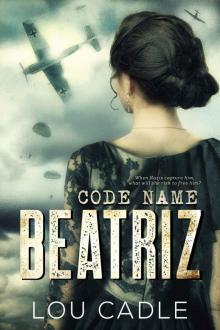 Code Name- Beatriz
Code Name- Beatriz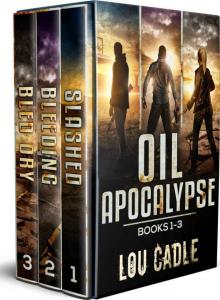 Oil Apocalypse Collection
Oil Apocalypse Collection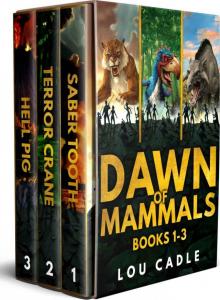 A Dawn of Mammals Collection
A Dawn of Mammals Collection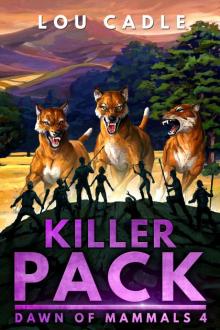 Killer Pack (Dawn of Mammals Book 4)
Killer Pack (Dawn of Mammals Book 4)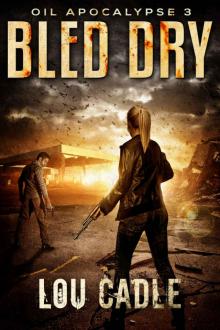 Bled Dry
Bled Dry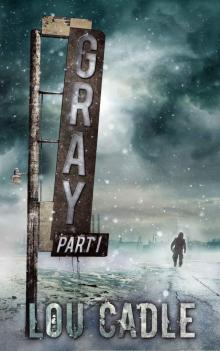 Gray (Book 1)
Gray (Book 1) Dawn of Mammals (Book 4): Killer Pack
Dawn of Mammals (Book 4): Killer Pack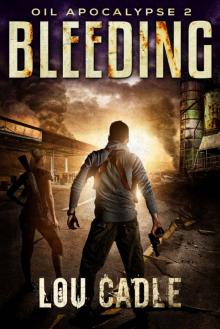 Bleeding (Oil Apocalypse Book 2)
Bleeding (Oil Apocalypse Book 2)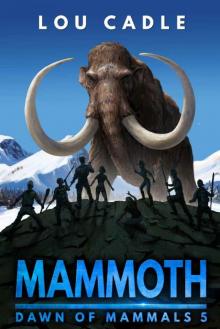 Dawn of Mammals (Book 5): Mammoth
Dawn of Mammals (Book 5): Mammoth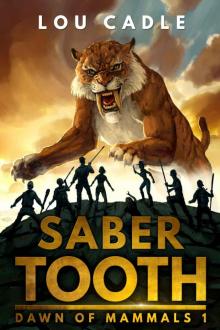 Saber Tooth (Dawn of Mammals Book 1)
Saber Tooth (Dawn of Mammals Book 1)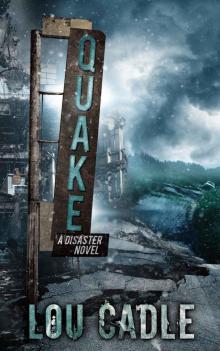 Natural Disaster (Book 2): Quake
Natural Disaster (Book 2): Quake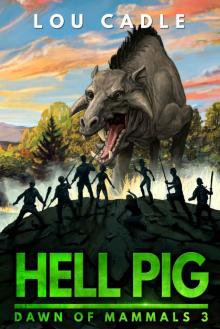 Hell Pig (Dawn of Mammals Book 3)
Hell Pig (Dawn of Mammals Book 3)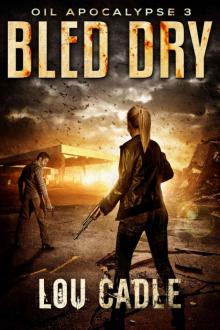 Bled Dry (Oil Apocalypse Book 3)
Bled Dry (Oil Apocalypse Book 3)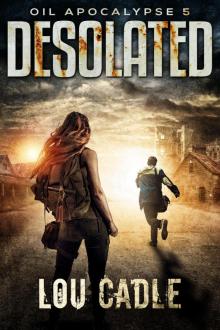 Desolated
Desolated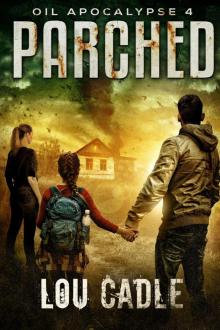 Parched
Parched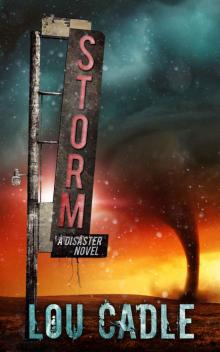 Natural Disaster (Book 3): Storm
Natural Disaster (Book 3): Storm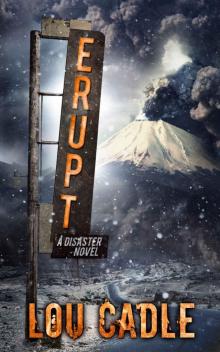 Natural Disaster (Book 1): Erupt
Natural Disaster (Book 1): Erupt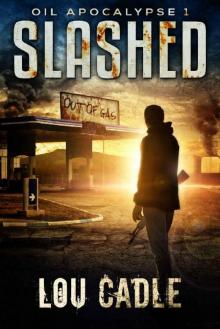 Slashed (Oil Apocalypse Book 1)
Slashed (Oil Apocalypse Book 1)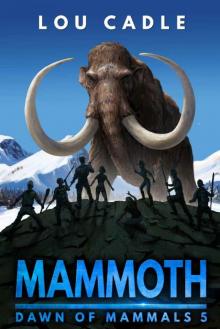 Mammoth (Dawn of Mammals Book 5)
Mammoth (Dawn of Mammals Book 5)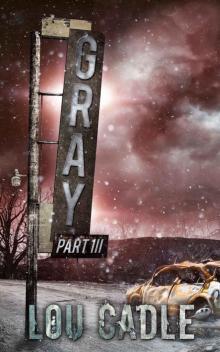 Gray (Book 3)
Gray (Book 3)